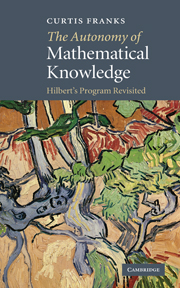2 - David Hilbert's naturalism
Published online by Cambridge University Press: 07 January 2010
Summary
INTRODUCTION
In [1922] David Hilbert delivered a series of lectures to the Hamburg University Mathematics Seminar outlining the methods for a program that would occupy him and his colleagues for roughly a decade. His report repeatedly emphasized the role that a certain type of consistency proof was to play in the realization of the program's aims. After the mathematical and philosophical communities came to understand the theorems of Gödel [1931] as demonstrating the unavailability of this type of consistency proof, they rejected on that ground Hilbert's program as a failed attempt at securing the foundations of mathematics. Indeed Hilbert's program has come to be identified in many minds with the production of an appropriate sort of consistency proof – so much so that his contributions to the foundations of mathematics are simply, in the opinions of many, a glib “formalism” regarding the nature of mathematics, a somewhat vague, proto-constructivist “finitism” regarding mathematical existence, and a radical, “all eggs in one basket” thesis according to which mathematics is a terminally unfounded enterprise unless the consistency of a significant portion of it can be proven (impossibly) according to the demands of these two restrictive “isms.”
This construal of Hilbert's program is difficult to reconcile with a continuous theme in his Hamburg lectures according to which one has every reason to believe in the consistency of mathematics, because of the clarificatory gains in the axiomatics of Weierstrass, Frege, Dedekind, Zermelo, and Russell and, most of all, because everything in our mathematical experience speaks for its consistency.
- Type
- Chapter
- Information
- The Autonomy of Mathematical KnowledgeHilbert's Program Revisited, pp. 29 - 60Publisher: Cambridge University PressPrint publication year: 2009



